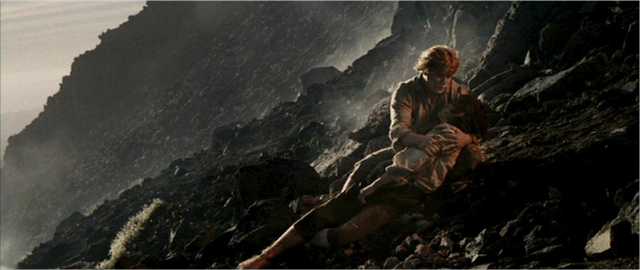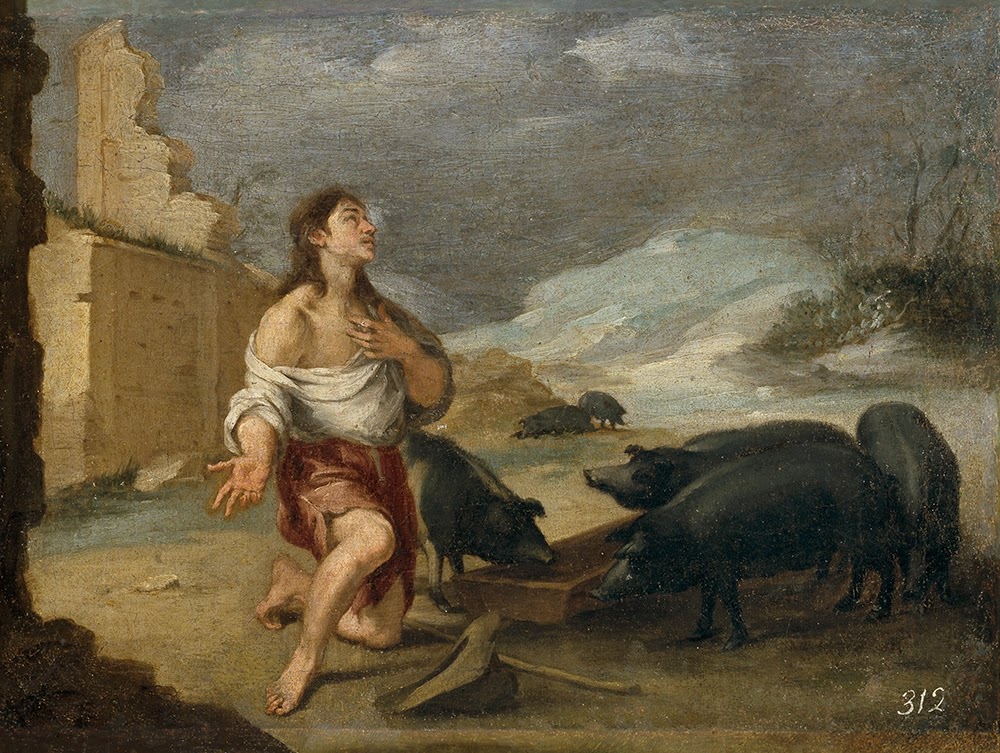3rd Sunday of Easter (C)
In the midst of their perilous climb to the heights of Mount Doom, Frodo and Sam stop to ask themselves “what sort of a tale we’ve fallen into” Is their story, they wonder, one that will have a good ending or a sad one? Both hobbits agree that, in any real story, the reader may guess what kind of tale it is, but “the people in [the tale] don’t know. And you don’t want them to.” At this point in their quest to destroy the One Ring and save Middle-earth, it seems – at best – unlikely that their story will end well. And yet Frodo and Sam are not discouraged from pressing on, for whether their story has a good-ending or a sad one is not ultimately up to them. What is up to them is to stay the course, even through the darkest pages, and not to close the book too early by giving up.
Although they carry on, Frodo and Sam do not, in fact, know what sort of tale they’ve fallen into. We, on the other hand, at least those of us who are familiar with The Lord of the Rings do, as did its author, John Ronald Reuel Tolkien. As a devout Catholic, Tolkien knew into which greater Tale his novel, spanning just over one thousand pages, was but only a footnote. The tale of Frodo and Sam and the quest to save Middle-earth was, in Tolkien’s mind, a small excerpt from the larger story of the salvation of the entire world, the cosmos in all its parts. To his mind, both his story and the story of salvation turn on the same logic; and it is this logic that makes it possible for his, lesser story to have a good-ending, for his is folded within the one great story that has the one truly good-ending. Saint Peter expressed that story’s logic before the Sanhedrin with these words: “The God of our ancestors raised Jesus, though you had him killed by hanging him on a tree.”
For Tolkien, the astonishing Resurrection of Jesus after his hideous death on the Cross is the kind of “sudden happy turn in a story which pierces you with a joy that brings tears” because in the face of sorrow and failure, when universal and final defeat seems imminent, there occurs “a sudden and miraculous grace: never to be counted on to recur.” And because this story – the story of Jesus’ death and unexpected resurrection – is true, then all lesser stories can likewise possess a similar plot, one that is not borne out of any naïve optimism, but rather is grounded in the hope that Christ has reversed even the finality of death by breaking open his own tomb.
We, like Tolkien, know the end of the story because it has been told to us in advance. We call the New Testament book from which today’s Second Reading is taken that of ‘revelation’, meaning that the veil has been pulled back from eternity, that we in time, might see, however dimly, the light of what is to come when the story of this world has come to its end. And we are told that the story of this world has, despite whatever may appear to the contrary, a good ending. For it will be then that the countless multitude will cry out in praise of “the Lamb who was slain” and every creature in all the cosmos will fall down in worship of Him. The story of this world is the story of the Lamb, struck down but not defeated, crucified but not dead, wounded and yet still whole. Whatever happens now happens only, and thus can only be understood, in the light of this, our story’s end.
That the end is told to us in advance is not to spoil the story, but to allow us make sense of it. The good ending gathers together the many divided and disparate stories of our lives, riddled as they are with wearing sorrow and fleeting joy, and reveals them to be but fragments of a narrative greater than our own. And although we may not know how exactly, and although it may very much seem otherwise, it is our faith in the Lamb who was slain – in Jesus Christ who was crucified and raised – that confirms our hope that whatever we experience in sorrow or joy already forms part of His story of universal and final victory. It is His-story that makes history in any sense possible, for it is the story of Christ that sheds light on our own and uncovers their true meaning.
As Christians, we know what sort of tale we’ve fallen into; and this knowledge of how the story ends enkindles a hope that compels us to live the stories of our lives in a manner distinct from those who lack it. Yet, amidst the daily perils we endure it can be difficult to remember that the tale we’ve fallen into has a good ending. In ways too numerous to articulate, pages of the particular stories of our lives can overwhelm us and inhibit our ability to see anything beyond them. That any good could come from this or that is – at best – unlikely. And yet, however much that may be the case, the greater story never ceases to be true, and thus come moments of unexpected and miraculous grace, when the veil that separates time from eternity is pulled back, and, even briefly, we glimpse the end of the story and can say with Saint John, “It is the Lord!” And when such moments come, we in like response ought with Saint Peter to jump into the sea and run toward him, for he has once again revealed himself to us that we may be reminded that he has been raised and nothing will ever defeat him.
But when we come to him, he will not hesitate to ask us the same question he asked Simon, the son of John: “Do you love me?”And, as with Simon, what Jesus desires to know – what stands at the essence of his question – is whether we will let our story be folded within his. For, when we were younger and thought in childish ways, we wanted to be the masters of our own history, the authors of our own narrative, as he tells us, “You used to dress yourself and go where you wanted.” But now your love of Christ and mine demands that “You will stretch out your hands, and someone else will dress you and lead you where you do not want to go.” That means for us, as it did for Simon Peter, that we will be led to the Cross; rather, it means that Christ will lead us to the Cross, to his Cross, upon which He, the Lamb of God, was slain and from which he reigns victorious. It is by his Cross, and by it alone, that our stories, in all their joys and sorrows, are folded into to his and thus, in the end, end well.
What the world needs today are storytellers––those courageous enough to testify and bear witness before all that their story, in all its complexity, is a chapter, a footnote, a word within the overarching and all-embracing story of God’s love – the story of the love that conquers even death itself. To bear witness to that story is what it means to evangelize: to proclaim the Good News that the Lord has rescued us, has changed our mourning into dancing, by giving us the capacity to live our story each day, no matter how perilous its trials, in the light and joy of his victory.
May the Holy Spirit be poured anew into our hearts this day, that we may bear witness to the One who assures us that, in him, our story, and that of the whole world, will have and, in truth, already has a good-ending.

-1.jpg)


Comments
Post a Comment